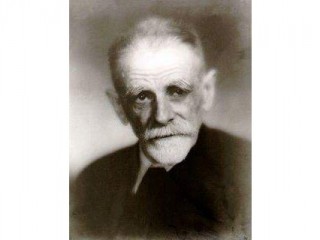
Kostis Palamas biography
Date of birth : 1859-01-08
Date of death : 1943-02-28
Birthplace : Patras, Greece
Nationality : Greek
Category : Famous Figures
Last modified : 2011-09-07
Credited as : poet, Olympic Hymn,
The Greek poet Kostes Palamas played a dominant role in the development of modern vernacular, or demotic, Greek literature. He drew inspiration from popular mood and expression and gave voice to the aspirations of a people long isolated from their ancient traditions.
Kostes Palamas was born on Jan. 8, 1859, at Patras, the son of a local magistrate, whose death orphaned the boy at the age of 6 and left him in the care of an uncle in Missolonghi. There Palamas received his primary and secondary education, moving to Athens in 1875 with the intention of studying law; he left the University of Athens, however, without completing a degree. In the early 1880s Palamas struggled to support himself as a journalist and literary critic; during these years he became involved with the Demotikistes, moving quickly to the vanguard of this literary school that sought to replace the anachronistic "official" language of government and education with the popular idiom. Palamas published his first collection of lyric verse, entitled Tragoudia tes Patridos mou (Songs of My Fatherland), in 1886.
The following year Palamas married Maria Valvi, by whom he had three children. The poet wrote perhaps his most moving expression of personal grief in "The Tomb, " a poem in memory of his son Alki, who died at the age of 9. During these years filled with struggle and polemic, Palamas produced scores of newspaper articles, and he translated the New Testament and the works of several western European authors into modern Greek. He published a well-known short story, "A Man's Death, " in 1895, and issued a collection of poems, lambs and Anapaests, in 1897. That year Palamas was named secretary general of the University of Athens, a position he held until his retirement in 1926.
Asalefte Zoe (Life Immovable), Palamas's next collection of verse, appeared in 1904. It exhibited his increasing variety of mood and metrical form. The intensely felt thematic polarities of his work (love of life/mortal anguish; patriotic feeling/bitter denunciation of his homeland; love of past glories/break with any cult of the Greek past; Hellenism/ Christianity) became more and more insistent. In 1907 Palamas published Dodecalogos tou Gyftou (The Twelve Lays of the Gypsy), perhaps his most important work. The Gypsy poet, an outcast possessed only of his vital language, wanders from creative tasks to love and to the death of gods and of the ancients, finally becoming a prophet and uniting at last science, nature, and man. A second work with epic horizons appeared in 1910, I flogera tou Vasilia (The King's Flute), set in latter-day Byzantine splendor and tracing the pilgrimage of Greek emperor Basil II to Athens and the Shrine of the Virgin Mary.
Palamas is also remembered for a drama, Trisevgene (The Thrice Noble or Royal Blossom), a highly lyrical piece. The poet, virtually a national hero, died in Athens on Feb. 28, 1943.
















